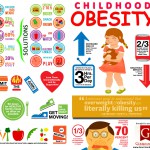(by Peter Bereris, Helen Amolohiti & Letta Kiriakopoulou)
The percentage of overweight children in the United States is growing at an alarming rate, with 1 out of 3 kids now considered overweight or obese.
Many kids are spending less time exercising and more time in front of the TV, computer, or video-game console. And today’s busy families have fewer free moments to prepare nutritious, home-cooked meals. From fast food to electronics, quick and easy is the reality for many people.
Preventing kids from becoming overweight means adapting the way your family eats and exercises, and how you spend time together. Helping kids lead healthy lifestyles begins with parents who lead by example.
The Effects of Obesity
Obesity increases the risk for serious health conditions like type 2 diabetes, high blood pressure, and high cholesterol — all once considered exclusively adult diseases. Obese kids also may be prone to low self-esteem that stems from being teased, bullied, or rejected by peers.
Kids who are unhappy with their weight may be more likely than average-weight kids to:
- develop unhealthy dieting habits and eating disorders, such as anorexia nervosa and bulimia
- be more prone to depression
- be at risk for substance abuse
Overweight and obese kids are at risk for developing medical problems that affect their present and future health and quality of life, including:
- high blood pressure, high cholesterol and abnormal blood lipid levels, insulin resistance, and type 2 diabetes
- bone and joint problems
- shortness of breath that makes exercise, sports, or any physical activity more difficult and may aggravate the symptoms or increase the chances of developing asthma
- restless or disordered sleep patterns, such as obstructive sleep apnea
- tendency to mature earlier (overweight kids may be taller and more sexually mature than their peers, raising expectations that they should act as old as they look, not as old as they are; overweight girls may have irregular menstrual cycles and fertility problems in adulthood)
- liver and gall bladder disease
- depression
Preventing Overweight and Obesity
The key to keeping kids of all ages at a healthy weight is taking a whole-family approach. It’s the «practice what you preach» mentality. Make healthy eating and exercise a family affair. Get your kids involved by letting them help you plan and prepare healthy meals, and take them along when you go grocery shopping so they can learn how to make good food choices.
And avoid falling into these common food / eating behavior traps:
- Don’t reward kids for good behavior or try to stop bad behavior with sweets or treats. Come up with other solutions to modify their behavior.
- Don’t maintain a clean-plate policy. Be aware of kids” hunger cues. Even babies who turn away from the bottle or breast send signals that they’re full. If kids are satisfied, don’t force them to continue eating. Reinforce the idea that they should only eat when they’re hungry.
- Don’t talk about «bad foods» or completely eliminate all sweets and favorite snacks from kids” diets. Kids may rebel and overeat these forbidden foods outside the home or sneak them in on their own.





